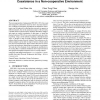Free Online Productivity Tools
i2Speak
i2Symbol
i2OCR
iTex2Img
iWeb2Print
iWeb2Shot
i2Type
iPdf2Split
iPdf2Merge
i2Bopomofo
i2Arabic
i2Style
i2Image
i2PDF
iLatex2Rtf
Sci2ools
119
click to vote
MSWIM
2009
ACM
2009
ACM
Socially conscious channel selection in 802.11 WLANs for coexistence in a non-cooperative environment
The increasing number of independent IEEE 802.11 WLANs owned and managed by autonomous users has led to increased interference, resulting in performance degradation and unfairness. Performance can be improved by allowing these networks to operate on different channels. Due to the autonomous nature of the networks, a suitable channel selection scheme should be distributed, adaptive and require no explicit coordination. In this paper, we model the channel selection of WLANs as a non-cooperative game in a learning setting. Using a novel method of acquiring a disruption factor value, we propose a class of socially conscious channel selection schemes based on game-theoretic learning. These schemes are distributed, adaptive and are able to improve fairness without explicit inter-network communication. These features allow the WLANs to coexist in an interference-limited but non-cooperative environment. They also have the advantage of not requiring any modification to the existing 802.11 sta...
Channel Selection | Channel Selection Schemes | Ieee 802.11 Wlans | Modelling And Simulation | MSWIM 2009 |
| Added | 19 May 2010 |
| Updated | 19 May 2010 |
| Type | Conference |
| Year | 2009 |
| Where | MSWIM |
| Authors | Joo Ghee Lim, Chun Tung Chou, Sanjay Jha |
Comments (0)

